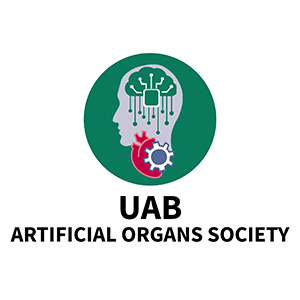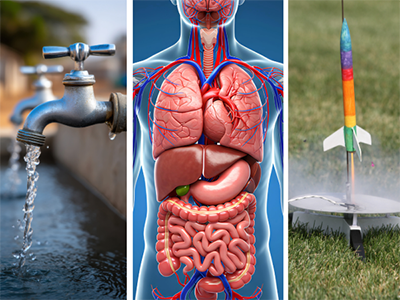From the water to the stars to the vanguard of modern medicine, three new student organizations are offering UAB students with a wide range of opportunities for networking, exploration, and innovation.
This fall, UAB engineering students helped start student chapters of the following groups:
- Young Water Professionals (YWP)
- Artificial Organ Society
- Rocketry Club
All three organizations are registered chapters of national organizations and are open to all UAB students, regardless of their field of study.
To explore all UAB student organizations, log in to UAB Engage.
Young Water Professionals
President: Sam Reid
Faculty Advisor: Jason Kirby, Ph.D.
UAB Young Water Professionals (YWP) was created by civil engineering graduate student Hannah Szcepanski, and is a joint student chapter of the national organizations American Water Works Association (AWWA) and Water Environment Federation (WEF)/Alabama's Water Environment Association (AWEA).
“I initially learned about AWWA and WEF/AWEA through my internship at Hazen and Sawyer, and I was encouraged by my supervisor to attend local AWWA & WEF/AWEA Young Professional events,” said Szcepanski, who serves as the groups vice president. “I wanted to establish a student chapter to share the same professional opportunities with others and help develop the next generation of water/wastewater industry leaders”.
Szcepanski says her goal is for UAB YWP to become the campus hub for students interested in water/wastewater and an avenue for them to begin building connections with local industry representatives. “We plan to host various industry tours and share networking/scholarship opportunities sponsored by AWWA and WEF/AWEA. Members may also attend the Alabama-Mississippi Water Joint Annual Conference next spring in Mobile.”
Artificial Organ Society at UAB
President: Javier Dominguez De Leon
Faculty Advisor: Palaniappan Sethu, Ph.D.
 Not so long ago, research into artificial organs was a realm being explored by only the most advanced scientists. Today, undergraduates from a variety of engineering and other scientific fields are contributing to the field.
Not so long ago, research into artificial organs was a realm being explored by only the most advanced scientists. Today, undergraduates from a variety of engineering and other scientific fields are contributing to the field.
Palaniappan Sethu, Ph.D., Professor of Medicine and Biomedical Engineering and director of the Cardiovascular Bioengineering Laboratory, attended a conference of the American Society for Artificial Internal Organs (ASAIO) earlier this year. At the conference, he learned that there were only two existing student chapters—and none in the Southeast.
“UAB has a rich history in the area of artificial organs and organ transplantation, so I thought this would be a great place to create a chapter where our students can organize and leverage research and educational opportunities,” Sethu said.
Sethu sent emails to engineering students to gauge their interest, and a group quickly formed. Over the summer, the group elected officers and was recognized by ASAIO as an official student chapter.
“Our primary purpose is to gain exposure to the latest in artificial organ technologies and organ transplantation through events such as seminars, shadowing opportunities and attending the annual ASAIO meetings for networking and career development,” Sethu said. “We also want to connect students with individuals/labs/centers at UAB where they can observe, interact with and learn more about artificial organs and their use in patients. As a result of this, we hope to have research opportunities and ideas for senior design projects and opportunities for individuals to purse independent projects. Also, being part of the organization will allow students to gain valuable experience in leadership, advocacy and the opportunity to make a difference.”
Rocketry Club at UAB
President: John Francis Zech
Faculty Advisor: Cheng-Chien Chen, Ph.D.
Also launching this fall is the Rocketry Club at UAB—a group with a multi-disciplinary leadership team that is dedicated to “advancing STEM education through hands-on rocketry projects.”
Chapter President John Francis Zech is a mechanical engineering major, but he says the opportunities created through participation in rocketry events could benefit students from any background through the development of practical skills in teamwork, leadership, technical design, software, safety, documentation and logistics.
Members of the group are part of Tripoli Rocketry Association. This year’s inaugural team plans to compete at the NASA University Student Launch Initiative (USLI). “Through this competition, our team will showcase their technical abilities, explore engineering applications in the real world, learn how to analyze flight and payload data, and become acquainted with the engineering design process and rocket fabrication,” said Zech.
In addition to competitions for current students, Zech says a major focus of the group will be outreach to Birmingham-area students through educational engagement events.
